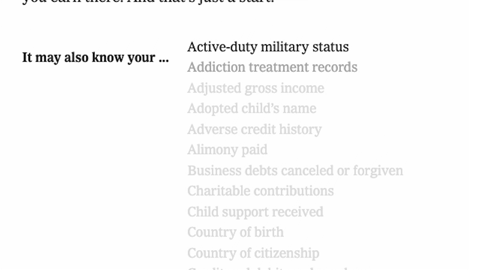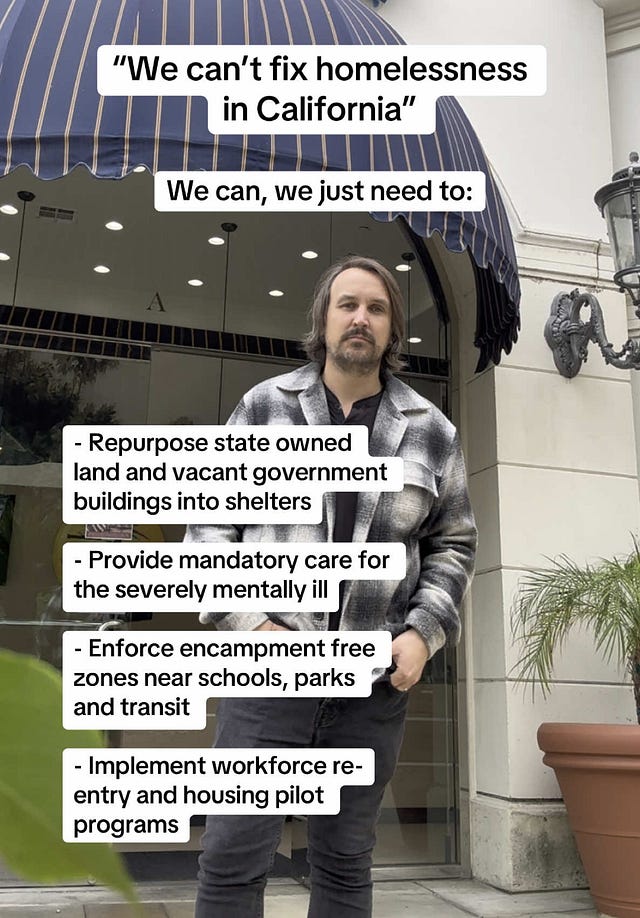Palanitir’s building a Putin-esque surveillance state for Trump
ALSO INSIDE: This congressional candidate is the original influencer (as in, Myspace famous)
Cam here 👋 bringing you your daily dose of what people are doing – good, bad, and otherwise – in the world of politics. We’re diving into the stories you won’t see anywhere else. And remember, you can also keep up with me over on TikTok and Bluesky.
What Happened
Trump’s budget bill is meeting resistance in the Senate, and his negotiation tactics—like calling US Sen. Rand Paul “actually crazy (losers!)” —don’t appear to be working.
But his administration has something in the works that Trump could soon use to force compliance in a way his 80s “Art of the Deal” tactics never could: a comprehensive, searchable database of all the information the government has on… well, everyone. Currently, the data that the government keeps on its residents is segmented: only the Department of Education knows your student loan balance, and only the IRS knows what non-profits you’ve donated to. The information becomes more personal for people who utilize services like government healthcare or apply for public business grants.
Intertwining this data has major privacy concerns, and tactics like this have been used by the Russian government to identify and oppress people they determine to be “anti-government.” Consolidating data on US residents has been a central focus of Musk’s work at DOGE, as part of which he has already accessed over 250 different categories of data, according to an analysis by The New York Times.
Now that they have the data, the Trump administration has hired far-right billionaire Peter Thiel’s data company, Palantir, to create a comprehensive database. In addition to using this information to escalate the administration’s attacks against immigrants even further, this compiled data could be used for:
Minority Report-style predictive policing, like what is being used by the Kremlin: people are targeted as potential criminals based on combining information like financial stress (did you file for unemployment?), recent criminal history (like a recent speeding ticket), and social media posts
Loss of benefits, where someone on a fixed income could be kicked off Medicare or SNAP, by cross-referencing spending habits and medical records to disqualify eligibility
The creation of government risk scores, similar to what’s been implemented in China, that could be used to deny bank loans, fail rental applications, or impose higher interest rates and deposit fees
Labor camps, as suggested by Human and Health Services Secretary Robert Kennedy Jr., where someone prescribed certain medications who filed for unemployment could be forced to stay at “wellness farms”
On the campaign side, data collection at this level has been used to silence or blackmail political opposition and microtarget voters. The Trump administration would have a powerful tool to subdue senators like Paul, as well as give the president the power to expand his ability to microtarget voters with specialized propaganda that can appeal to individuals’ most intimate personal details.
Trump’s team exhibited their willingness to weaponize data against the slightest opposition during Wednesday’s press briefing. When a reporter asked Press Secretary Karoline Leavitt about the Congressional Budget Office’s assessment that Trump’s budget would increase the national deficit, she accused the entire office of 250 employees as being anti-Trump because “there isn’t a staffer in the entire congressional budget office that has donated to a Republican since the year 2000.”
Attempts to Sanewash
Trump leans on GOP senators as they gear up to make changes to his domestic policy bill
Senate forges ahead with tight timeline to approve Trump's "big beautiful bill"
Far-Right Spin
NYT Says Trump Taps Palantir To COMPILE DATA On Americans, THEY’RE LYING
Peter Thiel’s Palantir is Building Out ‘ImmigrationOS’ Software to Help ICE Track Illegal Aliens
Fannie Mae joins Palantir to launch AI-run mortgage fraud unit
Scientists host four-day livestream that spurs thousands to action
For 100 hours beginning May 28, a group of over 200 scientists from NASA and similar agencies hosted a livestream on YouTube, where they talked about the work they’ve done, what they hope to accomplish, and how societal advancements could be at risk as a result of the Trump administration’s disinvestment in scientific endeavors.
The stream started off with a clear portrayal of the stakes at hand: scientists were packing up the Goddard Institute for Space Studies, a NASA facility the Trump administration demanded be shut down by June. The Institute focused on research into global weather patterns and the impact of climate change on the environment.
All in all, it was a massive success—especially for a group of non-media-savvy public servants who work in complicated, specialized fields that might be hard to understand for a casual viewer. Nearly 200,000 people watched live, and over 7,000 people took them up on their call-to-action, asking people to call their representatives in Congress and tell them to preserve funding for weather and climate science.
US Rep. Ken Calvert, California’s 41st Congressional District
Since taking office in 1993, Rep. Calvert has:
Seen his net worth increase from $3 million to nearly $23 million
Sponsored 267 bills, 12 of which have been signed into law
Received more money from the defense industry during the 2022 midterms than almost any other congressional candidate
Staffed his congressional office with dozens of lobbyists, including representatives for Lockheed Martin, Boeing, and the National Potato Council
Received a $265,000 campaign boost from Elon Musk during the 2024 election
Used his position to allegedly score very beneficial land deals for himself and his realtor friends
Promised to only serve six terms, but this is his 16th
Fun Facts
Throughout his three decades in Congress, Rep. Calvert has made it a priority to bring his expertise in real estate to Washington—particularly when it scores him a nice payoff. He’s shown an acute ability to use earmarks—which are guarantees in the federal budget that certain amounts of money can only be used for certain projects—to make previously worthless land spike in value. Maps of earmarked transportation projects he’s signed off on are often lined with properties tied to Calvert. Such deals have been found to violate state laws in 2007, made him the subject of an FBI investigation in 2009, and sparked outcry as recently as 2024, when Calvert secured millions in federal funds to improve the areas around 10 rental properties he owns in Riverside.
But it hasn’t all been business: during his first term, Calvert was caught in what he described as “an extremely embarrassing situation” with someone police described as a “known prostitute.” The incident happened during Calvert’s prime mid-life crisis years, shortly after his wife left him, and resulted in neither criminal nor political consequences.
Myspace to Congress?
The 2026 midterms feel a lifetime away, but political newcomers who are fed up with what they’ve seen in the first few months of an unchecked Trump presidency are already lining up to challenge his congressional enablers. One such candidate is a musician from Corona, California named Tim Myers.
Anyone around during the golden age of social media might remember the band OneRepublic, a group that Myers started with some friends that then blew up on Myspace. He turned that into a successful—but not necessarily lucrative—music career, with 16 records that have either gone gold or platinum through his label, Palladium Records.
Myers’ campaign for California’s 41st Congressional District is either a longshot or a stroke of strategic genius—only time will tell which it is. He’s running against Calvert, who is both the state’s longest-serving congressional Republican and its most vulnerable. Calvert has fended off challenges from teachers, IT workers, and lawyers in the past–but never a rock star with the name ID and connections to rival his own.
Myers joins a cohort of non-traditional candidates—including an abortion rights influencer and a new media journalist on the left, and a former NFL kicker and a QAnon darling on the right—who hope their non-political clout can translate to electoral victory.
Advertise in this newsletter
Do you or your company want to support COURIER’s mission and showcase your products or services to an aligned audience at the same time? Contact advertising@couriernewsroom.com for more information.












